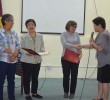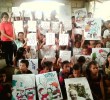QUEZON PROVINCE ?Foreign observers expressed concern over the harassment of young poll watchers by suspected military agents in Sariaya, Quezon province,
Irene Anoso, a nineteen-year old pollwatcher of Kabataan (Youth) party list in Brgy. Poblacion, Sariaya, complained to members of the People’s International Observers Mission (IOM) team in Quezon about being profiled, pursued, and sent malicious text messages by suspected military agents.
Anoso told the team that men in military haircut but wearing civilian clothes started taking pictures and videos of pollwatchers in precincts in Brgy. Poblacion at around 8:00 a.m. last May 14. These men carried dubious Commission on Election (Comelec) IDs lacking basic information, such as names, pictures, and authorized signatures.
When she and another Kabataan Party-list pollwatcher were on their way home that night in Sariaya, a red car with a government plate kept sidetracking the tricycle they were riding on. They were trailed for about an hour by the said vehicle. At around 7:42 pm that day, Anoso received a text message that read: “Kamusta ang binabantayan mo na party-list ng NPA?” (How is the NPA party-list that you are watching for?)
She received similar reports that men in motorcycles were roaming around that night, looking for Kabataan pollwatchers.
Kabataan party list is among the progressive party-lists being discredited by the Arroyo administration and by elements of the 74th and 76th Infantry Brigade of the Philippine Army deployed in Quezon as “front organizations” of the Communist Party of the Philippines-New People’s Army.
In the IOM teams’ travel across Quezon province, international observers noted the proliferation of black propaganda against progressive party-lists Bayan Muna (People First), Anakpawis (Toiling Masses), and Gabriela Women’s Party.
“Slogans maligning progressive party-lists, usually painted on sacks or over campaign posters, are usually found in areas near military detachments,” said Johan Fobbelets, a trade union leader from Belgium and spokesperson of IOM Quezon team.
He added that such testimonies and observations only confirmed reports of systematic efforts by the Armed Forces of the Philippines to prevent progressive party-lists from gaining congressional seats through black propaganda, threats, and actual violence.
“The attacks against progressive party-lists tend to show that the Philippine elections is an exercise in silencing the voices of the marginalized, rather than that of democracy,” said Fobbelets. ###
2007 Elections









